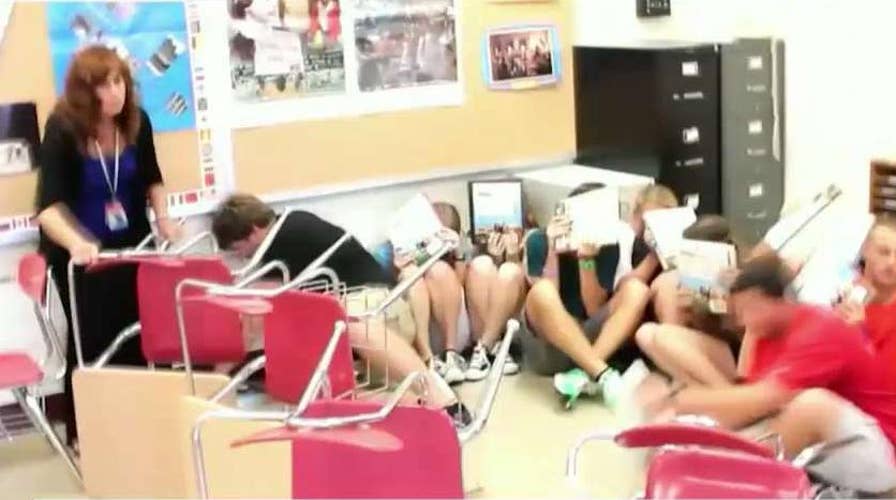Indiana school takes extreme measures to keep students safe
Using $400,000 of its own money, Virginia-based NetTalon has outfitted a test school in Indiana with state of the art security.
School shooters, like guerrilla fighters or terrorists, possess a power to spread widespread fear and grief way out of proportion to their actual strength. That fact has added complex wrinkles to the ongoing debate over the expense, intrusiveness and direction school security should take.
But in Shelby County, Ind., one company with its eye on that school safety goal has an idea about how to cut through the complications. It's sparing no expense in trying to create a showpiece for ideas on developing a safer school.
Using $400,000 of its own money, Fredericksburg, Va.-based Net Talon has funded a test security program at a high school in that Indiana county.
There, teachers wearing wireless key fobs can activate a system of alerts.
Smoke canisters and other undisclosed countermeasures are deployed.
Bulletproof doors and windows are locked, and areas contained.
And real-time video is fed back to the Sheriff's Department, enabling law enforcement to know where a shooter may be at any given moment, potentially shortening life-saving response times.
"It's absolutely impossible that we'll ever be in a position to stop any type of crazy attack or bizarre circumstance," says Indiana Attorney General Curtis Hill. "However, we can understand with some predictability what kind of attack we're vulnerable to and put things in place, " he told Fox News.
In a White House roundtable meeting last week, Hill conveyed his enthusiasm about the program to President Donald Trump, who appeared less impressed.
"Do they have anyone inside with a gun who can take on the man outside the door?" asked the president, who has talked of finding ways to "harden" school sites against safety threats. He also wants to bolster security from the inside, and has advocated arming and training teachers to intervene in situations like the shooting massacre that left 17 dead at a Parkland, Fla., school earlier this month.
Mr. Trump's apparent skepticism about the Indiana experiment is matched by other doubts. For instance, a $400,000 price tag to fortify one school may be prohibitive for many cost-strapped school districts. In addition, some psychologists believe such beefed up security might actually encourage some profoundly troubled shooters to act out.
"It's not a deterrent. It's attractive," says Dr. Jordan Peterson, a psychologist at the University of Toronto. "It increases drama and spectacle. Imagine you're designing a movie set, swarming with armed guards, it just ups the challenge."
Florida is taking a different route, in part, with plans to empower students with technology they know and like -- an app called Fortify Florida.
"So many kids are on Instagram, Snapchat, and they're seeing things: 'Hey, I’m gonna shoot up the school, I’m gonna drive a truck into the school, I’m gonna blow up the school,' but also suicide and bullying," says Florida Attorney General Pam Biondi.
"They need a uniform way to report that in the condition of anonymity. And that's what this app will do, " she told Fox News.
Some fear this could swamp authorities with a flood of petty reports - a known risk evidenced by the failure to act on the many warnings about Nicolas Cruz, the accused gunman in the Parkland spree.
One promising area is threat assessment based on a U.S. Secret Service model. The Association of Threat Assessment Professionals is advocating a program that would compile data on at-risk individuals including any record of domestic violence, workplace and school violence, arson, sabotage and other warning signs. "Our focus is on how to train the teachers, law enforcement officers, the family members, the bartenders, the hairstylists, everyone out there on how to spot concerning behavior and how to report it, said Dr. Russell Palarea, association president.
Palerea said the intention is not to intrude on civil liberties, but to use the data to counsel and warn families, friends and teachers of a troubled person.


